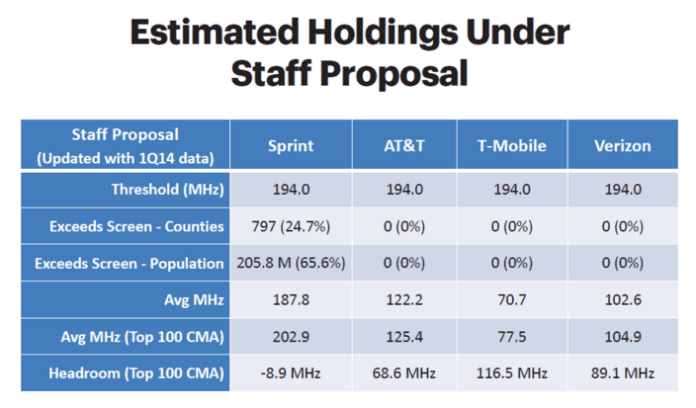In addition to auction plans, the Federal Communications Commission today adjusted its spectrum screen rules, noting that it will place increased emphasis on deals involving sub-1 GHz spectrum as well as include a wider range of spectrum bands in decision making.
The sub-1 GHz emphasis will include a closer look at deals that would result in an individual operator controlling more than one-third of available spectrum in a market. However, the FCC did remove the 700 MHz D-Block that is currently tied to the FirstNet nationwide public-safety network from that screen, which would make it more attractive for commercial operators to partner with FirstNet on that effort.
The FCC also said it would include the recently auctioned H-Block spectrum, the AWS-4 band and educational broadband services spectrum in the 2.5 GHz band to its screen. The inclusion of the 2.5 GHz band is seen as a loss for Sprint, which controls a vast majority of that spectrum, in some cases close to 150 megahertz in some markets. The carrier noted that it was disappointed in that inclusion as it has argued spectrum that high up in the frequency chart does not propagate as well as sub-1 GHz spectrum and thus should not be judged in a similar fashion.
“We are disappointed … that in revising its spectrum screen the commission did not recognize the varying impact of commercial spectrum bands on broadband competition,” explained Lawrence Krevor, VP of spectrum, legal and government affairs at Sprint, in a statement. “As a result, the revised spectrum screen will not help the commission identify transactions that warrant a more detailed competitive analysis.”
Analysts have noted the increased desirability of sub-1 GHz spectrum, explaining how its superior propagation characteristics enhance both coverage and in-building penetration, thus lowering overall network deployment costs compared with higher-band spectrum.
That decision could have an impact on Sprint’s consolidation plans as it will now be viewed as having a substantial spectrum portfolio across most markets. The carrier has been rumored to be in talks about a possible acquisition of smaller rival T-Mobile US, though the FCC’s decision could throw a further wrench in those plans.
“We will fully review the decisions announced today to determine Sprint’s next steps,” Krevor added.
Wheeler did note that should the current “structure” of the domestic wireless market change, the FCC could further alter its spectrum screen rules.
Bored? Why not follow me on Twitter

Spectrum screen reset to Sprint’s dismay
ABOUT AUTHOR
